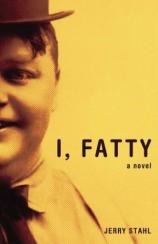I, Fatty
Review
I, Fatty
"What do you do when the world thinks you're a monster, and you
know it's the world that's monstrous?" This question is posed by
Roscoe "Fatty" Arbuckle in Jerry Stahl's heart-eating,
fictionalized portrait of the turn of the century's original star
of Hollywood meltdown.
Meltdown (or becoming the "monster") has been mastered by
contemporary fallen stars Michael Jackson, Robert Blake, and
Courtney Love. The difference between this dreaded threesome and
the dearly departed Fatty is that Arbuckle was incinerated by
courtroom media scandal at the zenith of his sparkling
vaudeville-to-screen career, not as a post-fame footnote. This fact
is what gives I, FATTY, a Kafkaesque masterpiece, its flavorful rum
punch in the face. In proving that fat is far stranger than
fiction, Stahl's Fatty is clearly guilty of a crime he did not
commit.
As a writer for the pre-millennium hit TV show "Alf," Stahl has
publicly lived the chaotic celluloid life of success, breakdown and
redemption. He was even nabbed by the Keystones on Fatty's old
front lawn. In Fatty's smelly old clown shoes, Stahl romances,
chills, thrills, revolts, and delivers the sweat drenched goods in
this impossible to put down imagination of the mind controlling the
plump though flaccid funny man who made Hollywood's first million
dollars as a contract actor and lost everything after being accused
of a brutal "Coke bottle rape" that killed young actress Virginia
Rappe.
From the days of Fatty's unusual arrest and three-trial
prosecution, America has not reconciled its fear of fat. Thanks to
this blood curdling imbroglio of 1921, even the success of
charming, Bowflex-bucking Teletubbies John Goodman, Kirstie Alley
and James Gandolfini are highly suspect. But I, FATTY is more than
a mouthful of lunchmeat versus morality.
Like O.J. Simpson, Fatty lived to see his own character
assassination at the hands of the district attorney, the lawyers,
families and "friends," on both sides of the case, and the
Hearst-controlled tabloid media --- a "crusifiction" --- can I get
a witness for this fact ladies and germs? --- at the hands of a
court, press and public that assumed Fatty was guilty before
hearing any of the facts and, of course, before hearing one word
from Fatty himself.
But Fatty didn't do it. Sure, he was psychologically abused by his
father and downed enough Prohibition-era bathtub gin and morphine
to stagger Jumbo the elephant, but he didn't kill the "virgin" Vi
Rappe --- her abortion doctor did. For starring in too many lead
roles as the pie-faced man, eating a few too many cream buns and
washing them down with fire water, Fatty got set up by a producer
with a grudge, a whore with an attitude, a bad lawyer, a DA with
gubernatorial dreams, and a whole bunch of other phonies who used
Fatty's big butt to cover their own.
Post-World War I America, and Hollywood, needed a fall guy to show
the commies and the liberals that women belonged at home, barefoot
and pregnant --- not in the factories or in the voting booths ---
and that Tinsel Town was not the arbiter of porn. Short skirts,
bobbed hair and feminism be damned! As a modern-day Job, Fatty was,
as Stahl relates, the first Hollywood fall guy, but no one at the
studios told Fatty until it was too late. See, they made a killing
themselves at the box office when Fatty was the hero and made
themselves look Holier than Thou in the conservative social circles
when Fatty was the devil. So, Fatty found, either the box of donuts
(whiskey, fatty foods, sex, sinful thoughts, racy movies, bad actor
behavior) went, or he went. And Hollywood still writes these types
of scripts, for movies and for reality; quick, name the high and
low points in the career of Paris Hilton.
Best supporting roles and comic relief are offered --- as well as a
hipster education in 1920s Broadway and Hollywood culture --- by
Buster Keaton, Mabel Normand, Mary Pickford, Charlie Chaplin,
William Randolph Hearst, Bob Hope, Milton Berle, Fatty's three
wives, and others in this fiction that will make you, Miss or Mr.
American film star wannabe, think twice about going on a reality
show.
The reality is … drum roll please … there is no such
thing as reality, only perception, which, as Fatty and so many
others learned, is a fatal dose of remembrance and imagination.
Oscar Wilde, step aside --- Jerry Stahl is back in town!
Reviewed by Brandon M. Stickney on January 22, 2011
I, Fatty
- Publication Date: July 23, 2004
- Genres: Fiction
- Hardcover: 256 pages
- Publisher: Bloomsbury USA
- ISBN-10: 1582342474
- ISBN-13: 9781582342474




